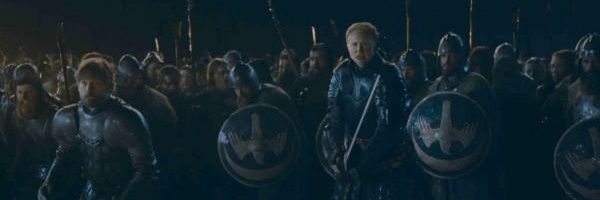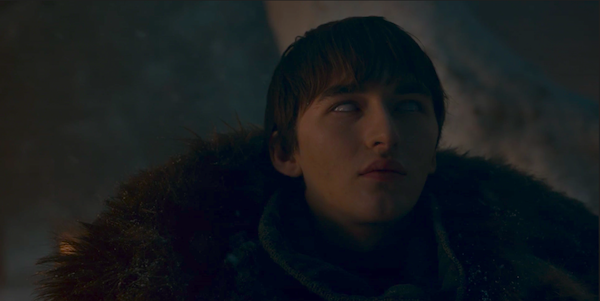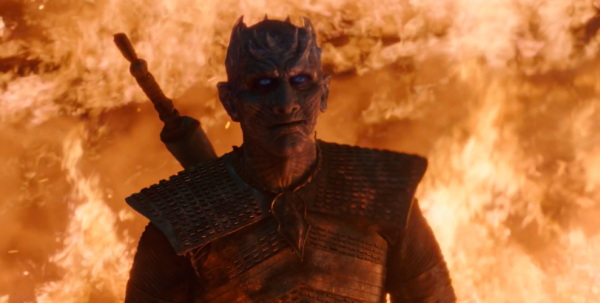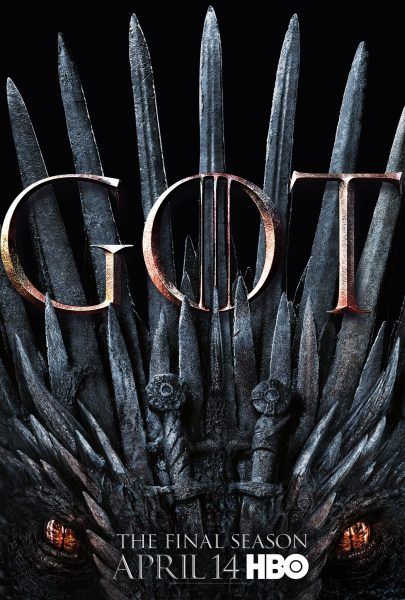The break between George R.R. Martin’s Game of Thrones and David Benioff & Dan Weiss’ Game of Thrones has become increasingly clear as the show has left Martin’s books behind. Even if you aren’t familiar with all the lore and details Martin has packed into his novels, you can see that in Martin’s view, he’s rebelling against standard fantasy tropes. He doesn’t play nice, and one of the aspects that hooked viewers was how Game of Thrones could be unexpected. It could kill a main character in Ned Stark. It could kill heroic characters like Robb and Catelyn Stark. Game of Thrones knew the rules of the fantasy genre, so it knew how to break them.
But it became painfully clear with “The Long Night” that Benioff and Weiss don’t have the stomach for upending fantasy tropes and really challenging their audience. Last week’s episode, “A Knight of the Seven Kingdoms” was so focused on being nice and giving almost every character a grace moment that it felt like the only way to pay it off would be to kill plenty of characters. Instead, “The Long Night” chickened out, dealing away a handful of minor characters, a couple majors, and making sure that the deaths were heroic instead of random and unfair.
This was bound to happen because the episode has no structure. We don’t know what the battle plan is beyond putting Bran near the Weirwood Tree, and basically creating the biggest game of Capture the Flag that Westeros has ever known. While it would be fine knowing that the Night King would eventually make his way towards Bran (he’s a clear endpoint), what was the plan before that? Why send the Dothraki as a first wave? How is that not just wasting troops against an enemy you know can raise the dead? What was the plan here besides getting pushed further and further back into Winterfell until Arya drops out of literally nowhere and stabs the Night King?
The lack of a clear battle plan denies a structure to the episode. We don’t know what our heroes are hoping to do, and it looks like they have a completely lack of leadership, which isn’t great since their Queen, Daenerys, and their hero, Jon Snow, are both at Winterfell. Even if the plan broke down, that would provide a nice ebb and flow to the battle so that you could see how the characters respond when their plan is upended. It would make the Battle of Winterfell more than just the Army of the Dead charging at the Army of the Living.
You could make the argument that the lack of plan provides more chaos to the battle, but chaos means randomness and unfairness, which Benioff and Weiss had no interest in pursuing. Every name character who died perished in a heroic fashion. Dolorous Edd died saving Sam, his brother from the Night’s Watch. Lyanna Mormont died taking down a freaking undead giant. Beric Dondarrion died holding off the dead from Arya and the Hound. Theon, knowing he was going to die, bravely charged at the Night King. Jorah dies protecting Daenerys. Melisandre, who showed up for no reason, provided some valuable magic before choosing to die at the end of the episode.
“The Long Night” was as close are you’re going to get to all-out war on Game of Thrones, but in the hands of Benioff and Weiss, war is still ordered and nice. Sure, lots of people die, but they’re background characters! There’s nothing random and terrifying about it, because if someone important dies, they’ll die in glory! And then they didn’t even bother to play their strongest card available against the Army of the Dead: resurrection.
Imagine a “Long Night” episode where instead of a few minor characters getting offed and then resurrected, it’s not only major characters who die, but then they get resurrected too. Could Jaime fight off an undead Brienne? Would Tyrion kill an undead Varys? These relationships had the opportunity to be tested in the most horrific way possible, and instead Benioff and Weiss didn’t even have the stomach to make the undead name characters confront people they knew. Sam didn’t have to look at an undead Edd. That would be too hard. Better to just keep this endless battle going until Arya teleports to right above the Night King and stabs him with Valyrian steel.
Last season, the episode “Beyond the Wall” made me deeply concerned that Benioff and Weiss didn’t have Martin’s ruthlessness with offing characters. It was a suicide mission and only Thoros, a minor character, died (I guess you could count Viserion in there as well, but it’s a dragon, not a person – and it came back). I tried to rationalize it by assuming they were saving the biggest deaths for the final season, and “The Long Night” was the biggest episode where most characters were in danger. But instead, Benioff and Weiss blinked.
Slaughtering characters wholesale doesn’t inherently make a show good, but what Game of Thrones used to understand is that random death made this world dangerous and unpredictable. It took us away from a standard fantasy tome and made the story feel fresh and new. But when it came time for Benioff and Weiss to show that life in Westeros is unfair and sometimes heroes die unglamorous deaths, they couldn’t do it. And while we can keep trying to give the showrunners the benefit of the doubt (maybe a lot of people will die in the battle against Cersei!), they clearly whiffed on the biggest battle in the show’s history. Sure, the Army of the Dead was fearsome, but not so fearsome that they could take away a character you really cared about.




